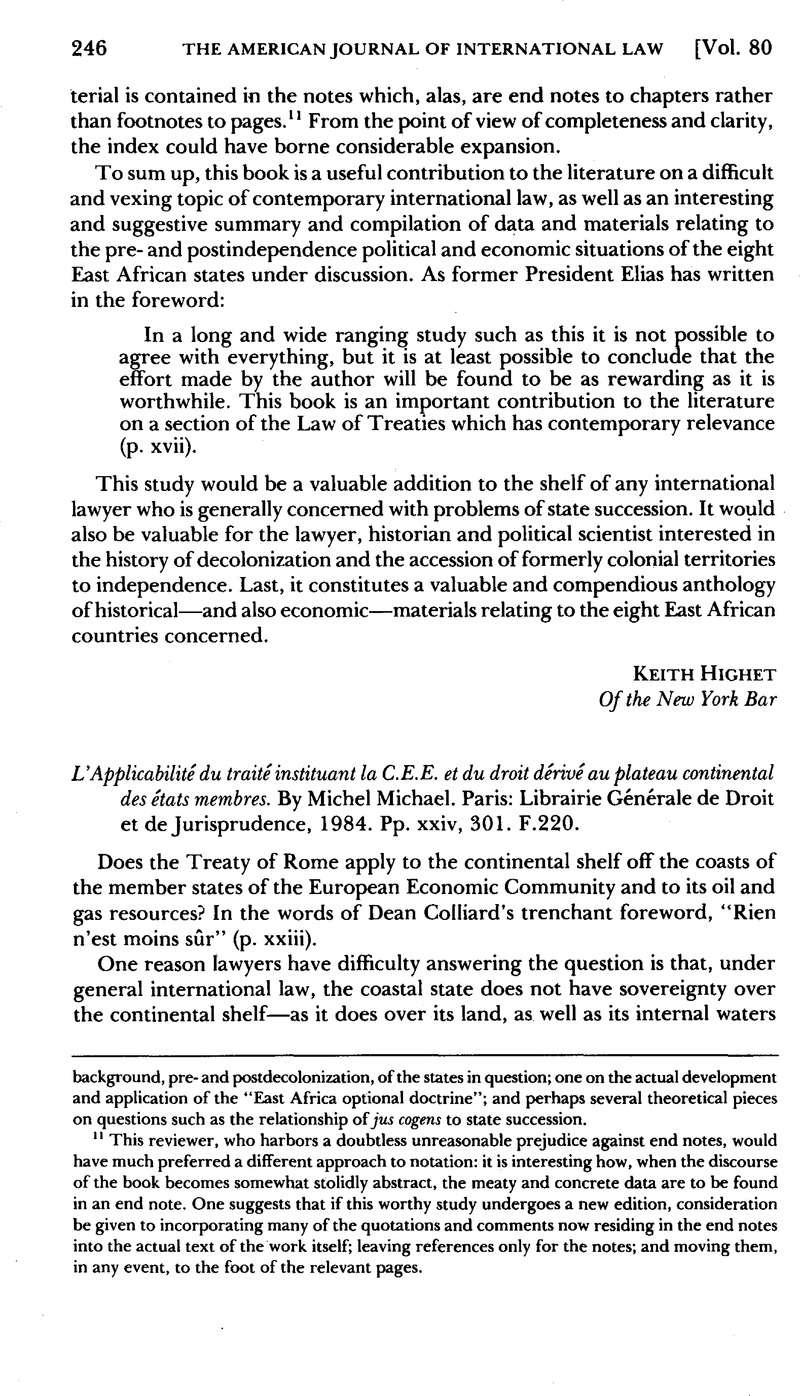No CrossRef data available.
Published online by Cambridge University Press: 27 February 2017

1 Article 227, paragraph 1 of the Treaty specifies, “This Treaty shall apply to [here the article lists the names of the member states].” If relevant, paragraph 4 is scarcely more illuminating: “The provisions of this Treaty shall apply to the European territories for whose external relations a Member State is responsible.” Treaty Establishing the European Economic Community, Mar. 25, 1957, Art. 227, paras. 1 and 4, 298 UNTS 11.
2 Compare pp. 102–03. Mr. Michael might note that Georges Scelle of France rejected the concept of the continental shelf in the International Law Commission, [1951] 1 Y.B. Int’l L. Comm’n 346, UN Doc. A/CN.4/SER.A/1951, as did West Germany in its proposal to the 1958 Conference on the Law of the Sea, 6 United Nations Conference on The Law of the Sea, Official Records 125–26, UN Doc. A/CONF.13/42 (1958).
3 Article 84 applies common rules to transport by rail, road and inland waterway but defers the imposition of Community rules with respect to sea and air transport to a subsequent unanimous decision of the Council. EEC Treaty, supra note 1, Art. 84.
4 Continental Shelf (Libyan Arab Jamahiriya/Malta), 1985 ICJ 13, 33 (Judgment of June 3).
5 In December 1984, the Community submitted a declaration regarding its competence in connection with its signature of the United Nations Convention on the Law of the Sea. The declaration makes no express reference either to the continental shelf or to hydrocarbons. A footnote contains the following statement: “The United Nations Convention on the Law of the Sea shall apply, with regard to matters transferred to the European Economic Community to the territories in which the Treaty establishing the European Economic Community is applied and under the conditions laid down in that Treaty.” UN Law of the Sea Bull., No. 5, at 26, 27 (1985).
6 He credits Charles De Visscher with the thought (p. xvii).
7 One may argue that a similar dispute contributed to the bloodshed in Nigeria’s civil war.
8 This reader has the impression that, in addition to his enthusiasm for European integration in principle, Michael believes Greece would be in a stronger position with respect to its offshore boundary dispute with Turkey if it were defending Community interests. See p. 141 and n. 149.
9 See EEC Treaty, supra note 1, Arts. 9, 30, 35, 37.
10 See id., Arts. 111,113.
11 See id., Arts. 52, 59; see also id., Art. 92.
12 Id., Art. 113.
13 Id., Arts. 74–75.
14 Id., Arts. 38–39.
15 Aspects of the EEC Treaty, id., as well as the European Coal and Steel Community Treaty, Apr. 18, 1951, 261 UNTS 140, and the EURATOM Treaty, Mar. 25, 1957, 298 UNTS 167, are of course relevant.
16 At least in some respects this may depend on the possibilities for achieving unanimity under Article 235 of the EEC Treaty, supra note 1, or Council practice following the so-called Luxembourg accords. See 5 ILM 316, 317 (1966); A. Parry & J. Dinnage, Parry & Hardy: EEC Law 31–32 (2d ed. 1981). For a review of energy policy measures taken, see 3 H. Smit & P. Herzog, The Law of the European Economic Community, sec. 103.02[a][2], at 611–13, sec. 103.15, at 624–26 (rev. ed. 1985).
17 Such ideas are, as here, frequently accompanied by ritual intoning of an assumed need to combine in order to compete effectively with American giants. Precisely what happened to Shell and BP?